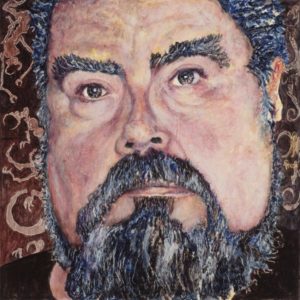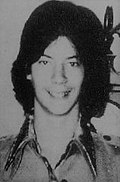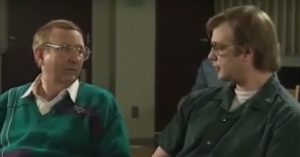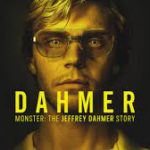
I have just started reading Savitri Devi’s magnum opus in an excellent hardback published by Counter-Currents (how I wish we had a similar print to publish our Daybreak Press books!). Already from the first chapter, Savitri speaks of the Kali Yuga, the term by which the ancient Aryans of India designated the darkest age (what we here call the darkest hour of the West, or of the fair race in the sense of the most beautiful race physically speaking). In Kali Yuga one must expect art to become pseudo-art or anti-art, as we can see in the latest Netflix spawn.
Dahmer – Monster: The Jeffrey Dahmer Story is an American biographical crime drama series, co-created by Ryan Murphy and Ian Brennan, and premiered this month. The series chronicles the murders of serial killer Jeffrey Dahmer, played by Evan Peters, from the point of view of his victims (for an audiovisual introduction of this series on YouTube see here).
Needless to say, the series is saturated with anti-white propaganda, and forces the audience to view the blacks murdered by Dahmer and their families with great sympathy.
Needless to say, I hit the forward button not to watch any homosexual scenes before and after Dahmer killed his victims. Watching that just tarnishes our spirit, as nowadays almost all white people have tarnished theirs by living in Kali Yuga. (The Netflix series is so graphic that it has Dahmer playing with the organs of his victims and even kissing a decapitated head.) If Maxfield Parrish’s paintings represented the zenith of American art a hundred years ago, this Netflix spawn is now the nadir…
But there’s something I have to say about what I got to see even though I kept pressing the forward button. I mean that the series follows the taboos of our time by trying to hide the cause of Dahmer’s astronomical mental illness. But let’s take it one step at a time.
The series fails by representing, in flashbacks, a dark-haired boy because the real-life Dahmer boy was blond. On the other hand, Netflix does well in filming the eternal screams of the fights between mom and dad when Dahmer was a child. But not only that hurt him. True, the series has Jeff Dahmer’s father, Lionel Dahmer, fighting with himself because he had played with the boy with dead animals whose corpses they handled as if that was funny. But people who knew Jeff and his family closely, for example Nick, said that Jeff had made a huge confession to him.
 (Left, the real Jeffrey Dahmer during the trial.) When his lover Nick asked the good-looking Jeff Dahmer how he had become a homosexual, Jeff broke down and told him everything. His father had abused him countless times from the ages of six to sixteen. And once the serial killer was caught, Mrs Pat Snyder commented on Geraldo’s TV show that Jeff’s stepmother was ‘the epitome of the evil stepmother’ (see what Nick and Pat said on Geraldo and Phil Donahue shows here and here).
(Left, the real Jeffrey Dahmer during the trial.) When his lover Nick asked the good-looking Jeff Dahmer how he had become a homosexual, Jeff broke down and told him everything. His father had abused him countless times from the ages of six to sixteen. And once the serial killer was caught, Mrs Pat Snyder commented on Geraldo’s TV show that Jeff’s stepmother was ‘the epitome of the evil stepmother’ (see what Nick and Pat said on Geraldo and Phil Donahue shows here and here).
Naturally, the media rejects these testimonies because they don’t want to touch the parental figure. I remember when I read the newspapers in 1991, when Dahmer was arrested, that I was upset that Dahmer told the press that there was no cause for his evil. I had already heard the same thing from another American serial killer, who was ‘clueless’ about the causes of his behaviour. But that is the crux of the matter: to the extent that the subject represses what his parents did to him, he will feel the urge to displace that nuclear hatred onto the bodies of animals or innocent humans.
One of the psychologists who interviewed Dahmer elicited a macabre confession from him. Dahmer’s dream was to have the skulls of his victims (remember, he collected their body residues) painted, in front of him, with two skeletons flanking the ritual: one already stripped from its flesh by Dahmer and the other relatively fresh; he sitting in a black chair, with his ‘friends’ (i.e. the corpses’ residues in that room). When asked by the psychologist why he had this fantasy, Dahmer replied: ‘I would finally feel powerful’.

Above, a diagram made by Jeffrey Dahmer himself about his ultimate fantasy (see YouTube explanation by the psychologist here).
Dahmer’s mind was a time bomb before his killings started. As a child’s mind registers the assault of the person to whom he is most attached, and more so if it is an assault of many years, what remains in the unconscious is the role of a perpetrator who is all-powerful with his ultra-passive body. If, as he grows up, he fails to blame his parents, inevitably his pent-up anger will try to find a scapegoat to vent the impotent rage that has built up since childhood.
The Netflix series doesn’t accuse the father of having used his son as a sex slave, nor the stepmother of being ‘the epitome of the evil stepmother’. The most it does is show the boy’s biological mother as a hysterical woman who constantly wanted to commit suicide before the eventual divorce.
But that isn’t direct abuse. That was not the kind of direct abuse that could have caused the compulsion to take it out on the bodies of others, although it may have been a contributing factor within that family’s maddening environment. Mrs Snyder’s above-linked testimony on the Geraldo show comes closest to painting for us the hell that such parents represented for the children. She even said that she foresaw that something very big was going to happen in that family.
A couple of years ago I said on this site: ‘In computer science rubbish in, rubbish out (RIRO) is the concept that, if the original data is aberrant, even the most sophisticated computer program will produce aberrant results or “rubbish” (in the US the term used is garbage in, garbage out, GIGO)’.
This is precisely why I despise a career in academic psychology. The trauma model of mental disorders is forbidden knowledge in the universities.
What academics ignore is that the self is a structure, and instead of realising that if we clutter that structure with rubbish we will get aberrant results, accepted wisdom would have us believe that when the child grows up, he will be a free and moral agent with a perfect moral compass and will overcome, if it wants to, the traumas of childhood by sheer will.
That’s nonsense of course. What really happens is that even with the most sophisticated mind if we program a child with rubbish we’ll get behavioural rubbish big time—e.g. what Dahmer did, especially if the trauma is unrecognised and only with confidants do some of the real stories come out (what Dahmer confessed to his lover Nick).
Even in the Netflix series you can tell that the relationship between dad and grown-up son was rather morbid. When he was caught, and Netflix took this from real events, Dahmer didn’t want a lawyer: he wanted his ‘dad’ to be notified. To understand the psychological basis of this whole affair one should understand the concept of attachment of the child-man-victim to the perpetrator. Colin Ross says in one of his books that the normal attachment we all feel to our parents goes to an order of magnitude infinitely higher in cases of severe abuse (see for example pages 35-40 of my book Day of Wrath).
And the day of wrath did eventually come in Dahmer’s biography, but not against the untouchable parents but with emissary goats whom he even ate, after killing them in cold blood (the night he was arrested, a human heart and male genitalia were found in his home’s freezer). Strange as it may seem, the diagram above, with the painted skulls ‘accompanying’ Dahmer in his fantasy, is not so bizarre to anyone who knows the history of ancient Mexico. As I wrote on page 88 of the aforementioned book:
The ballgame, performed from the gulf’s coast and that aroused enormous passions among the spectators, culminated in the dragging of the decapitated body so that its blood stained the sand with a frieze of skulls ‘watching’ the sport.
Pre-Hispanic Mexicans even painted the skulls of ritually sacrificed victims, as Dahmer fantasised to do, and for identical causes (see in Day of Wrath how Mesoamerican parents treated their children before the arrival of the Spanish).
The subject of how extreme parental abuse can cause psychic devastation as enormous as what some call schizophrenia, or even serial killing in the grown child, is a huge subject beyond what I can say in a post. Regarding serial killer cases, anyone interested in the subject can take a look at the work of criminologist Lonnie Athens. For the moment I can only ask the reader to keep an open mind to my theories, and those of Athens, so that in the future ethnostate criminology will break the taboo of touching the parental figure.
Lionel Dahmer wrote a book about his son omitting what he, and his two wives, did. I would like to end this post with the words of Antoin Caoimhin in his Amazon Books review, ‘Father is a Freak’:
The descent into a ritual of drugging, having sex, and killing may be a reenactment of the father’s abuse and then killing the father, using the victims as surrogates. I can speculate about the cannibalism but it is too disgusting and I’ll pass.
Caoimhin’s full review can be read here.
___________
Disclaimer of 3 November 2022: I’ve modified my analysis of Dahmer. See here, here, here and here.
 Someone who hasn’t processed his grief with a schizogenic mother, as the chess friend, is doomed to a perennial depression in which he wants to drag others into his maelstrom. And I don’t think anyone who has had extremely toxic parents who omits to write his most painful memories, even if that enterprise takes decades (as in my case), can heal his soul.
Someone who hasn’t processed his grief with a schizogenic mother, as the chess friend, is doomed to a perennial depression in which he wants to drag others into his maelstrom. And I don’t think anyone who has had extremely toxic parents who omits to write his most painful memories, even if that enterprise takes decades (as in my case), can heal his soul.








